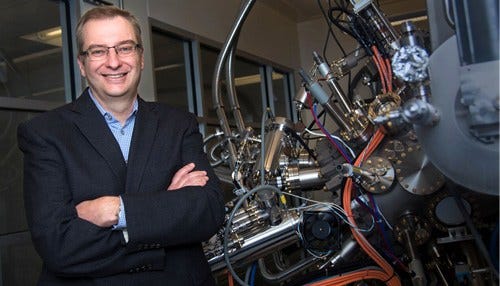Purdue, Microsoft Extend Partnership
 Michael Manfra (photo courtesy Purdue University)
Michael Manfra (photo courtesy Purdue University)
Subscriber Benefit
As a subscriber you can listen to articles at work, in the car, or while you work out. Subscribe NowPurdue University has announced a long-term collaboration extension with Microsoft Corp. (Nasdaq: MSFT) to build a scalable topological quantum computer. Purdue professor Michael Manfra says if the project is successful, "it will cause a revolution in computing."
Manfra is a professor of physics and astronomy, materials engineering, and electrical and computer engineering at Purdue. The university says the two entities are seeking to build the quantum computer by producing a "topological qubit."
A qubit is described as a quantum unit of information and the university says its five-year collaboration with Microsoft aims to build a quantum computer that is "robust" against interference from its surroundings and therefore, more stable and less error-prone.
"One of the challenges in quantum computing is that the qubits interact with their environment and lose their quantum information before computations can be completed," said Manfra. "Topological quantum computing utilizes qubits that store information ‘non-locally’ and the outside noise sources have less effect on the qubit, so we expect it to be more robust."
Purdue and Microsoft initially began the collaboration in April 2016, creating Station Q Purdue. The university says the new agreement extends that collaboration and will see Microsoft employees joining Manfra and his research team at the West Lafayette campus.
"What’s exciting is that we’re doing the science and engineering hand-in-hand, at the same time," said Manfra. “We are lucky to be part of this truly amazing global team.”
You can learn more about the partnership by clicking here.
